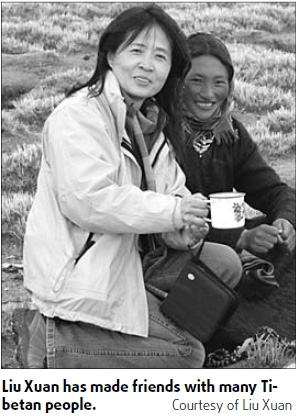Though she is vice-chairperson of the China Prose Poem Association, Liu Xuan was tongue-tied on her first visit to Tibet in 2001. "The lofty skies and expansive fields left me dumbfounded," she sighs.

But after working on the plateau for more than five years, she is ready to publish her third volume of poems on Tibet.
Every line of her poems expresses her deep love for Tibet and its people:
"At the foot of the Himalayas, I behold the majesty of medieval glaciers.
For the snow-clad plateau, I hold out my modest aspiration.
When night really falls, all coldness turns warm
And life rises out of ice and snow."
In 2004, Liu joined some 180 government employees from across the country to work temporarily in the Tibet autonomous region as part of a project to aid the region's development. She had been working at the State Information Office and was one of seven women on the team.
She recalls her tearful farewell, especially leaving behind her 12-year-old son.
"I could sense his misery as all along the way to the airport, he remained silent. His face was no longer childlike."
Soon after, she penned her poem "Son."
"When the cold winter comes deep into my heart, the son of my life is lonely afar," she wrote.
The poem tugged at the heartstrings of many mothers, both Tibetans and Hans, after its publication in the local magazine "Tibetan Literature."
Liu was appointed deputy director of the region's information office and later chaired its government news conferences.
When her tenure ended in 2007, she volunteered to work for another three years and has witnessed many historical developments in Tibet.
She also grew closer to ordinary Tibetans, visiting their homes frequently and eating wind-dried meat and sharing buttered tea on cold windy nights.
Before the Qinghai-Tibet Railway opened in 2006, Liu visited Nagqu in northern Tibet to find out what Tibetans thought of the first-ever rail on the plateau.
The head of a remote town, a young fresh college graduate, told her that the local herdsmen were very excited. "Some plan to make handicrafts for tourists; some want to build a yogurt plant. As for myself, I am willing to work here for at least 10 years," he told Liu.
Despite the great socio-economic benefits of the railway, many foreign media have been playing up the so-called ecological costs.
"Owing to misunderstanding and miscommunication, the foreign media's coverage of Tibet has been biased and far from the truth," Liu says.
Since 2004, she has been presiding over the news conferences held twice a month in Lhasa, detailing the great changes that have occurred in Tibetan people's lives. Her office also receives about 10 foreign journalist groups to Tibet each year. She has won the hearts of many journalists with her affability and frankness.
"Seeing ordinary Tibetan Buddhism believers fill the Barkhor Street in downtown Lhasa everyday, turning their prayer wheels, who would argue that there is no religious freedom in Tibet?" Liu says.
However, Liu has had her share of perils working in this mystical land. A delicate woman in her late 40s, she suffers from inadequate oxygenation of blood, but works more than 300 days on the plateau every year.
Last year, when the Olympic torch was taken to the world's highest peak, Liu chaired 15 press conferences for international journalists at a media center located at an altitude of 5,100 m. She eventually collapsed.
"My son has formed a habit of watching the weather forecast of Lhasa everyday," she says.
"I feel lucky to have spend the best years of my life in Tibet."
(China Daily July 16, 2009)